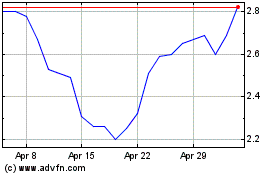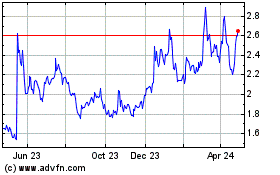Immutep Limited (ASX: IMM; NASDAQ: IMMP) (“Immutep” or “the
Company”), a clinical-stage biotechnology company developing novel
LAG-3 immunotherapies for cancer and autoimmune disease, today
announces positive efficacy and safety results from the TACTI-003
Phase IIb trial evaluating eftilagimod alpha (efti) in combination
with MSD’s (Merck & Co., Inc., Rahway, NJ, USA) anti-PD-1
therapy KEYTRUDA® (pembrolizumab) as first-line treatment of
recurrent or metastatic head and neck squamous cell carcinoma
patients (1L HNSCC).
These results with a data cut-off of 11 March
2024 were selected as a Proffered Paper oral presentation at the
European Society for Medical Oncology (ESMO) Congress 2024 and were
presented by Claus Kristensen, M.D., Ph.D., Head of Section for
Thoracic and Head and Neck Oncology, Rigshospitalet, Copenhagen,
Denmark, on 15 September. The data adds to the previously reported
overall response rates and safety data on 27 June and 12 July.
Dr. Kristensen
stated, "The efficacy and safety data in TACTI-003
are very encouraging and show the significant potential of this
novel immunotherapy combination to fight difficult-to-treat head
and neck squamous cell carcinomas. The clinically meaningful
improvement in responses for patients with high PD-L1 expression in
the randomised portion of the trial, combined with the compelling
response rates in patients with no PD-L1 expression, are a
testament to the complementary nature of efti in combination with
KEYTRUDA. I am particularly impressed that these higher response
rates and clear increase in biological activity seen in the efti
arm do not come at the expense of durability of response or lead to
an increased toxicity profile, which is often the case when
combining therapies in the search for more efficacious treatments
for cancer patients.”
Dr. Frédéric Triebel, CSO of
Immutep, said “Through multiple clinical trials, we see
the promise of efti to not only improve cancer patients’ clinical
responses to immune checkpoint inhibitors, but also to expand
patient populations who respond to them including patients with
negative PD-L1 expression. Once again, the TACTI-003 trial has
reinforced efti’s positive impact on both these fronts. We are
excited to see efti in combination with KEYTRUDA now driving a
1.9-fold increase in responses for head and neck cancer patients
with high PD-L1 expression as compared to KEYTRUDA alone, and a
statistically significant increase in absolute lymphocyte count in
the treatment arm showing efti’s biological activity in a
randomised setting.”
Marc Voigt, CEO of Immutep,
added “As we move into the latter half of 2024, we will continue to
follow the data in TACTI-003 and start to engage with regulatory
authorities regarding potential paths forward. We are certainly
pleased with durability we are seeing, which is consistent with
other trials in which efti combined with KEYTRUDA achieves a high
DOR, unlike many other therapeutic combinations. We are hopeful
this positive duration of response continues and, as seen in first
line non-small cell lung cancer in the TACTI-002 trial evaluating
efti in combination with KEYTRUDA, eventually contributes to an
overall survival benefit for patients with first line head and neck
cancer.”
ESMO Congress 2024 Proffered Paper Oral
Presentation
Title: Primary Results from TACTI-003: A
Randomized Phase IIb Trial Comparing Eftilagimod Alpha (soluble
LAG-3) Plus Pembrolizumab Versus Pembrolizumab Alone in First-Line
Recurrent or Metastatic Head and Neck Squamous Cell Carcinoma with
CPS ≥1
Clinical Highlights from Randomised
Cohort A in 1L HNSCC Patients with Any PD-L1
Expression (CPS ≥1)
Efti leads to higher Objective Response
Rates (ORR)
- Efti in combination with
pembrolizumab (E+P) led to a 32.8% ORR (34.5% including one partial
response reported after data cut-off) in evaluable patients with
CPS ≥1 (N=58) compared to 26.7% for pembrolizumab in evaluable
patients with CPS ≥1 (N=60), according to RECIST 1.1. Imbalances of
prognostic markers towards the pembrolizumab alone arm included HPV
status, smoking status, and primary tumour location.
- E+P outperformance in patients with
any PD-L1 expression was strongest in high PD-L1 expressing
patients (CPS ≥20) with a 31.0% ORR (N=29) versus an 18.5% ORR for
pembrolizumab alone (N=27), along with a complete response rate of
6.9% in E+P arm versus 3.7% for pembrolizumab alone. An additional
partial response was reported in CPS ≥20 after data cut-off leading
to a 34.5% ORR, a 1.9-fold increase in responses over pembrolizumab
alone in this patient group.
Efti maintains a high Duration of
Response (DOR)
- Durability of response was achieved
with the addition of efti with a median DOR of 17.5 months in the
E+P arm (N=58) as compared to 17.1 months in the pembrolizumab
alone arm (N=60)
- Data compares favourably to other
anti-PD-1 combinations with cytotoxic drugs like chemotherapy or
EGFR inhibitors, including a historical DOR of ~6 to ~7 months from
anti-PD-1 combined with chemotherapy in 1L HNSCC1-4
Efti increases Biological
Activity
- A statistically significant
increase in absolute lymphocyte count (ALC), measured as an
exploratory biomarker, was seen in the E+P arm as shown in the
graphic below, indicating an effective efti-induced immune response
in this randomised setting
- ALC increase is in line with data
from other Phase II trials evaluating efti in combination with
chemotherapy in metastatic breast cancer or pembrolizumab in
non-small cell lung cancer5-6
Efti continues to have favourable safety
profile
- Efti in combination with
pembrolizumab continues to have a favourable safety profile with no
new safety signals observed
- Discontinuation rate from treatment
emergent adverse events was similar for both E+P (4.3%) and for
pembrolizumab alone (4.4%)
- Unlike other combinations with
anti-PD-1 therapy, E+P continues to have a comparable safety
profile to pembrolizumab alone other than injection site reactions
as expected with efti’s subcutaneous delivery
Additionally, E+P drives a high ORR and Disease
Control Rate (DCR) in 1L HNSCC patients regardless of PD-L1
expression. In Cohorts A and B together (N=89), E+P achieved a
33.7% ORR (34.8% including one partial response reported after data
cut-off) including 31 patients in Cohort B with negative PD-L1 (CPS
<1). E+P also achieved a higher DCR compared to pembrolizumab
monotherapy across all PD-L1 expression levels, with a consistent
increase from 58.1% DCR in CPS <1, to 69.0% DCR in CPS 1-19, to
75.9% DCR in CPS
≥20. This new data
adds to the body of evidence that efti’s activation of
antigen-presenting cells provides a strong boost to the immune
system, enhancing the potential of immune checkpoint inhibitors
(ICI) such as KEYTRUDA. As the only MHC Class II agonist in
clinical development today, efti generates a broad anti-cancer
immune response in combination with ICIs regardless of PD-L1
expression, including for patients with negative PD-L1 expression,
in a unique and safe manner across multiple different cancers.
The ESMO Proferred Paper Oral Presentation
slides are available on the Posters & Publications section of
Immutep’s website.
Next StepsImmutep will continue
to follow the maturing data from TACTI-003, with the most relevant
endpoint of Overall Survival expected in 2025, and engage with
regulatory authorities regarding potential paths forward.
KEYTRUDA® is a registered trademark of Merck
Sharp & Dohme LLC, a subsidiary of Merck & Co., Inc.,
Rahway, NJ, USA.
About TACTI-003The Two ACTive
Immunotherapies-003 (TACTI-003) trial is an ongoing Phase IIb study
(also known as KEYNOTE-C34) evaluating eftilagimod alpha (efti),
Immutep’s proprietary soluble LAG-3 protein and MHC Class II
agonist, in combination with MSD’s (Merck & Co., Inc., Rahway,
NJ, USA) anti-PD-1 therapy KEYTRUDA® (pembrolizumab) as first line
treatment of recurrent or metastatic head and neck squamous cell
carcinoma (HNSCC). The randomized Cohort A portion of the study is
evaluating efti in combination with pembrolizumab as compared to
pembrolizumab monotherapy in patients with PD-L1 positive (Combined
Positive Score [CPS] ≥1) tumours, whereas Cohort B is evaluating
efti in combination with pembrolizumab in patients with PD-L1
negative tumours (CPS <1).
The primary endpoint of the study is Objective
Response Rate of evaluable patients according to RECIST 1.1.
Secondary endpoints include Overall Survival, Objective Response
Rate according to iRECIST, Progression Free Survival, and Duration
of Response. For more information about the Phase IIb trial, visit
clinicaltrials.gov (NCT04811027).
About ImmutepImmutep is a
clinical-stage biotechnology company developing novel LAG-3
immunotherapy for cancer and autoimmune disease. We are pioneers in
the understanding and advancement of therapeutics related to
Lymphocyte Activation Gene-3 (LAG-3), and our diversified product
portfolio harnesses its unique ability to stimulate or suppress the
immune response. Immutep is dedicated to leveraging its expertise
to bring innovative treatment options to patients in need and to
maximise value for shareholders. For more information, please visit
www.immutep.com.
Australian
Investors/Media:Catherine Strong, Sodali & Co.+61
(0)406 759 268; catherine.strong@sodali.com
U.S. Media:Chris Basta, VP,
Investor Relations and Corporate Communications+1 (631) 318 4000;
chris.basta@immutep.com
1 Cohen EEW et al. Lancet. 2019 Jan
12;393(10167):156-167. doi: 10.1016/S0140-6736(18)31999-8.2
Burtness B et al. Lancet. 2019 Nov 23;394(10212):1915-1928. doi:
10.1016/S0140-6736(19)32591-7.3 Haddad RI et al. J Clin Oncol. 2023
Apr 20;41(12):2166-2180. doi: 10.1200/JCO.22.00332.4 Dzienis M et
al. J Clin Oncol. 2024 Jul 22;42:2989-2999. doi:
10.1200/JCO.23.02625.5 Wildiers H et al. Clin Cancer Res. 2024 Feb
1;30(3):532-541. doi: 10.1158/1078-0432.CCR-23-1173.6 Forster M et
al. Journal for ImmunoTherapy of Cancer 2023;11. doi:
10.1136/jitc-2023-SITC2023.0595.
Immutep (NASDAQ:IMMP)
Historical Stock Chart
From Nov 2024 to Dec 2024

Immutep (NASDAQ:IMMP)
Historical Stock Chart
From Dec 2023 to Dec 2024
